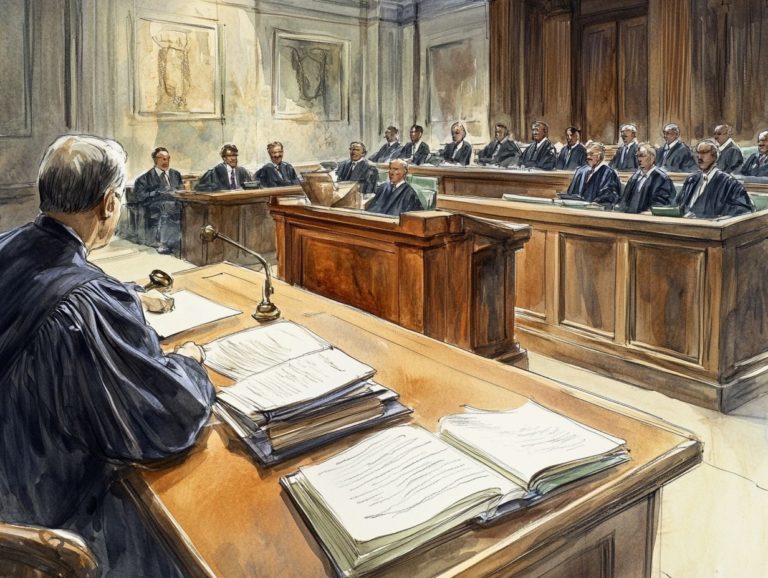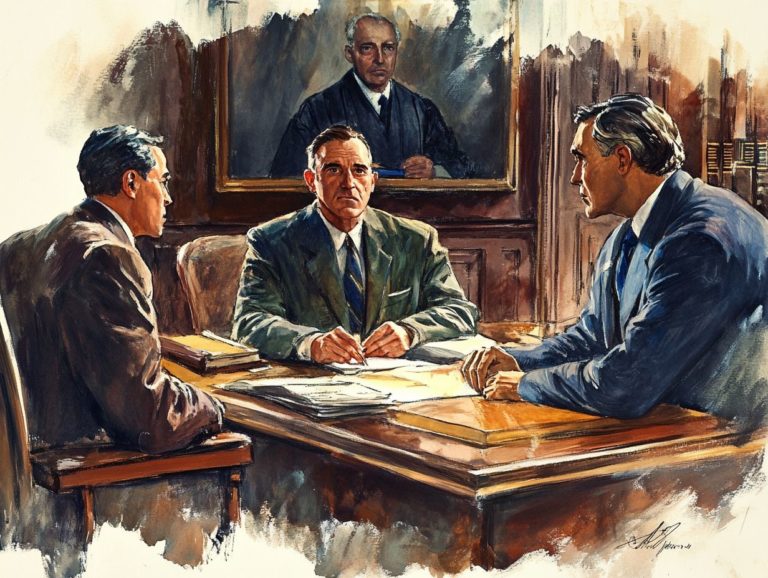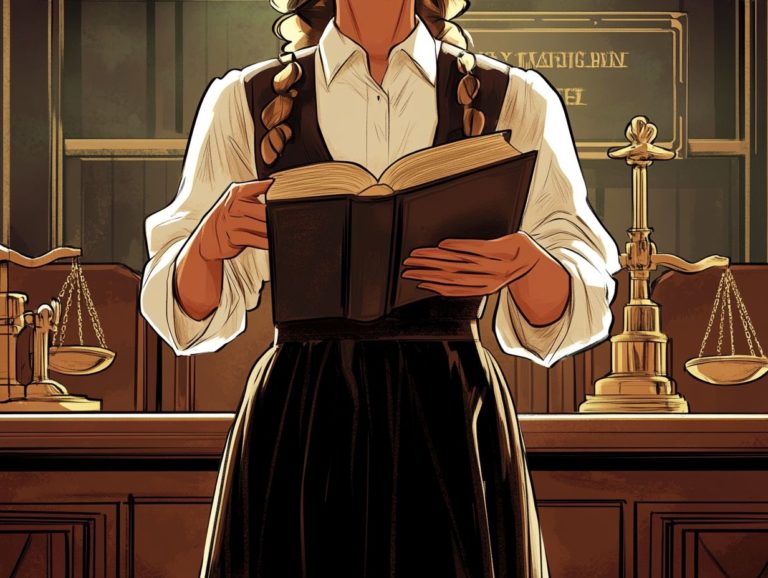Using Character Witnesses in Defense Strategies
In the intricate world of legal defense, character witnesses are game-changers that shape perceptions and influence outcomes. These individuals vouch for the defendant’s good character and reputation, becoming powerful allies in court.
Let s explore why character witnesses are essential, detailing when and how to use them effectively. From selecting the right individuals to preparing them for testimony, this guide outlines best practices and potential challenges. You ll learn how to leverage their influence in your defense strategy.
Contents
- Key Takeaways:
- The Role of Character Witnesses in Defense Strategies
- When to Use Character Witnesses
- Selecting and Preparing a Character Witness
- Presenting Character Witnesses in Court
- The Impact of Character Witnesses on the Case
- Potential Challenges and Limitations
- Preguntas Frecuentes
- 1. C mo puede beneficiar el uso de testigos de car cter a una estrategia de defensa?
- 2. Qui n puede ser considerado un testigo de car cter?
- 3. C mo pueden usarse estrat gicamente los testigos de car cter en un caso de defensa?
- 4. Pueden ser interrogados en contra los testigos de car cter por la fiscal a?
- 5. Son siempre beneficiosos los testigos de car cter en un caso de defensa?
- 6. C mo deben ser preparados los testigos de car cter para el juicio?
Key Takeaways:
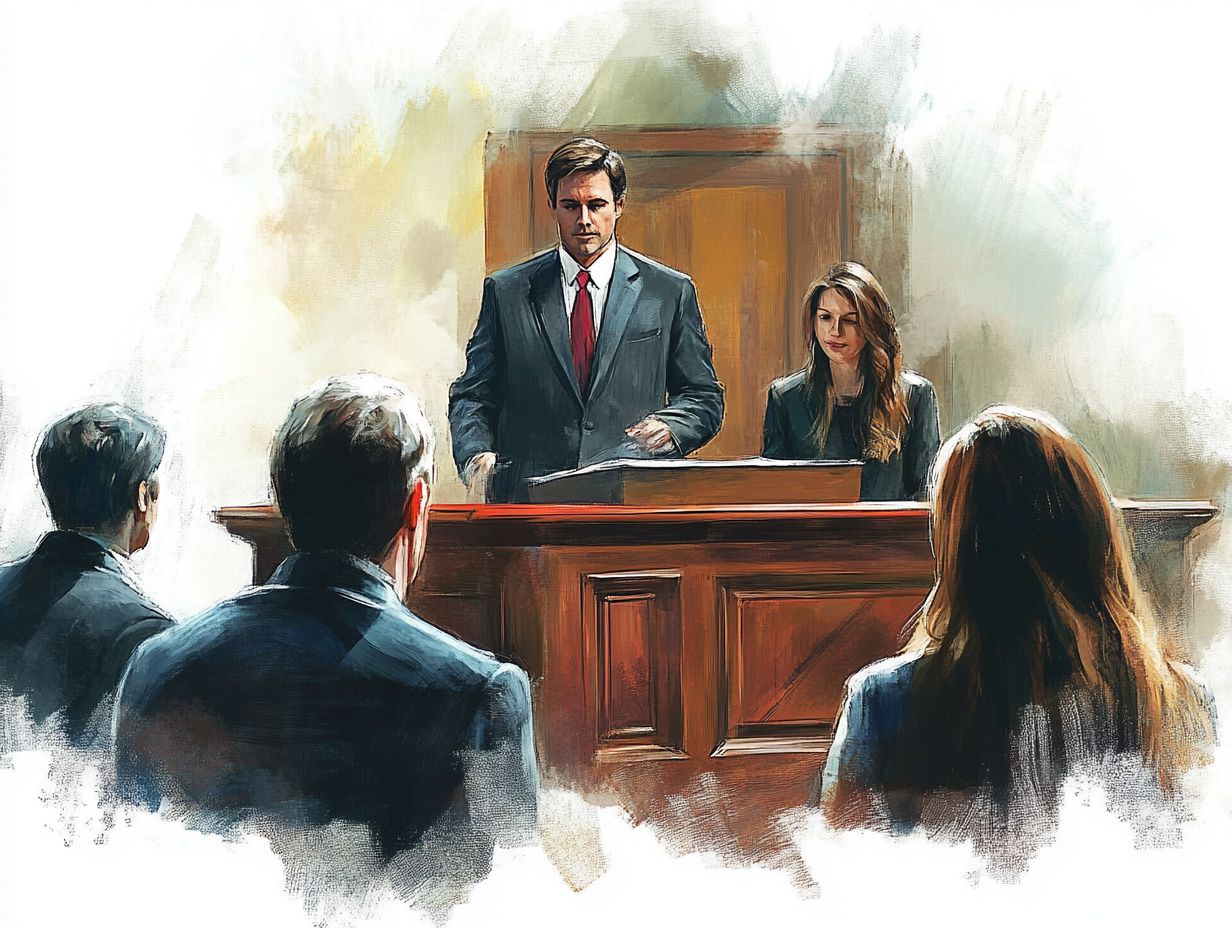
Character witnesses play a crucial role in defense strategies by providing positive testimony about the defendant’s character and credibility.
Carefully selecting and preparing character witnesses is essential, considering their credibility and relevance to the case.
Proper presentation and effective testimony from character witnesses can greatly impact the outcome of a case, though challenges and limitations must be considered.
The Role of Character Witnesses in Defense Strategies
Character witnesses serve a vital function in defense strategies during criminal trials. They shape how the jury perceives the defendant’s personality and good character.
Reliable witnesses can effectively highlight the defendant’s commendable qualities, influencing the legal proceedings and leading to more favorable outcomes.
Learn how to select and prepare character witnesses to supercharge your defense strategy, particularly in complex trials where character evidence is crucial to crafting a positive image for the jury.
What is a Character Witness?
A character witness is someone who provides testimony about a defendant’s character, reputation, and behavior in court. They often highlight positive attributes and moral values.
This testimony is essential, as it offers a broader perspective on the defendant’s conduct, demonstrating reliability and ethical standards beyond the specifics of the case.
By showcasing what the defendant means to their community and a history of good behavior, these witnesses can significantly shape jurors’ perceptions. The credibility of their testimony is crucial; a well-respected witness can elevate the weight of character evidence, potentially leading to a more favorable outcome for the defendant.
Ultimately, character witnesses are vital in creating a comprehensive picture of the person on trial, swaying opinions and contributing to a narrative of good character.
When to Use Character Witnesses
Don t miss out on the powerful advantage of using character witnesses in your defense! They can be especially beneficial in various cases, particularly in criminal trials.
In these cases, the defendant’s character plays a pivotal role in shaping the jury’s perception and ultimately impacting legal outcomes.
Types of Cases and Scenarios
Various types of cases greatly benefit from the inclusion of character witnesses, especially in criminal trials, domestic violence cases, and military justice. The defendant’s reputation within their community can significantly influence the jury’s decision-making process.
Character witnesses play a crucial role by providing insights into the defendant’s good character, swaying the perceptions of both the jury and the judge. For example, in a criminal trial, a character witness might highlight the defendant’s community service or positive contributions, framing them as a respectable individual.
In domestic violence cases, testimonials from friends or family can illustrate a history of non-violent behavior, potentially countering allegations of aggression. Likewise, in military justice, character references can emphasize the defendant s commitment to service, shaping the court’s approach to sentencing.
Ultimately, character witnesses contribute to a more nuanced understanding of the defendant, making the legal proceedings more reflective of the individual’s true persona.
Selecting and Preparing a Character Witness
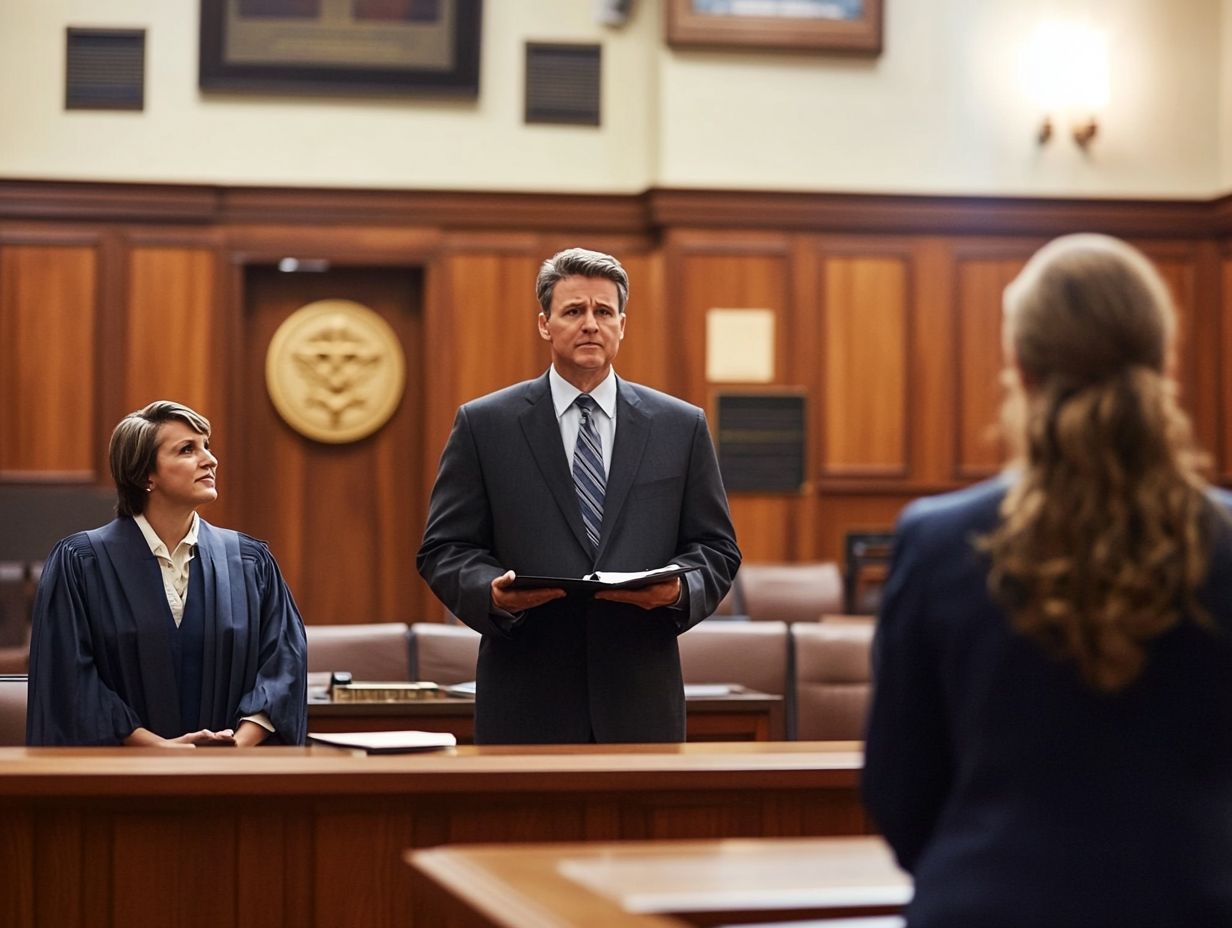
Selecting and preparing a character witness is essential for trial preparation. Their credibility and ability to articulate the defendant’s positive traits strongly influence how the jury sees the defendant and can determine the case’s outcome.
Criteria for Choosing a Witness
When selecting a character witness, consider key criteria: reliability, long-standing familiarity with the defendant, and their ability to convey character traits effectively in court. It’s also important to assess the witness’s credibility, including their professional background and community standing.
A character witness with strong moral principles can significantly enhance the defendant’s narrative. The nature of the witness’s relationship whether familial, professional, or a long-term friendship plays a crucial role, as it lends compelling context to their testimony.
Communication skills are paramount; the witness must articulate insights clearly and persuasively to ensure the jury understands the nuances of the defendant’s character.
Tips for Preparing the Witness
Preparation is key to making a powerful impact in court! Engage in thoughtful discussions about your experiences with the individual. Focus on specific anecdotes that showcase their admirable qualities while avoiding irrelevant tangents.
Understand the boundaries of what you can share, especially regarding personal opinions or information received from others that cannot be substantiated. Practice presenting your narrative clearly and concisely, highlighting positive attributes that genuinely reflect the individual s character.
Consider conducting a mock questioning session to become more comfortable with courtroom dynamics. This practice can significantly boost your confidence and enhance your chances of delivering a compelling account.
Presenting Character Witnesses in Court
When presenting character witnesses in court, navigate ethical standards and employ effective strategies to showcase the defendant in the best light. This approach can significantly influence jury perceptions and impact legal outcomes.
Best Practices for Testifying
Best practices for character witnesses include delivering clear and concise testimony, emphasizing the emotional reasoning behind observations, and maintaining reliability throughout the courtroom process. Following these practices will help your insights shine in court!
During your testimony, articulate your experiences and the context of your observations in a way that resonates with the jury. Employ effective presentation techniques, like maintaining eye contact and using a steady tone, to enhance your credibility.
Avoid unnecessary jargon and focus on relevant anecdotes to bolster your reliability, contributing to a more compelling narrative that supports the legal process.
The Impact of Character Witnesses on the Case
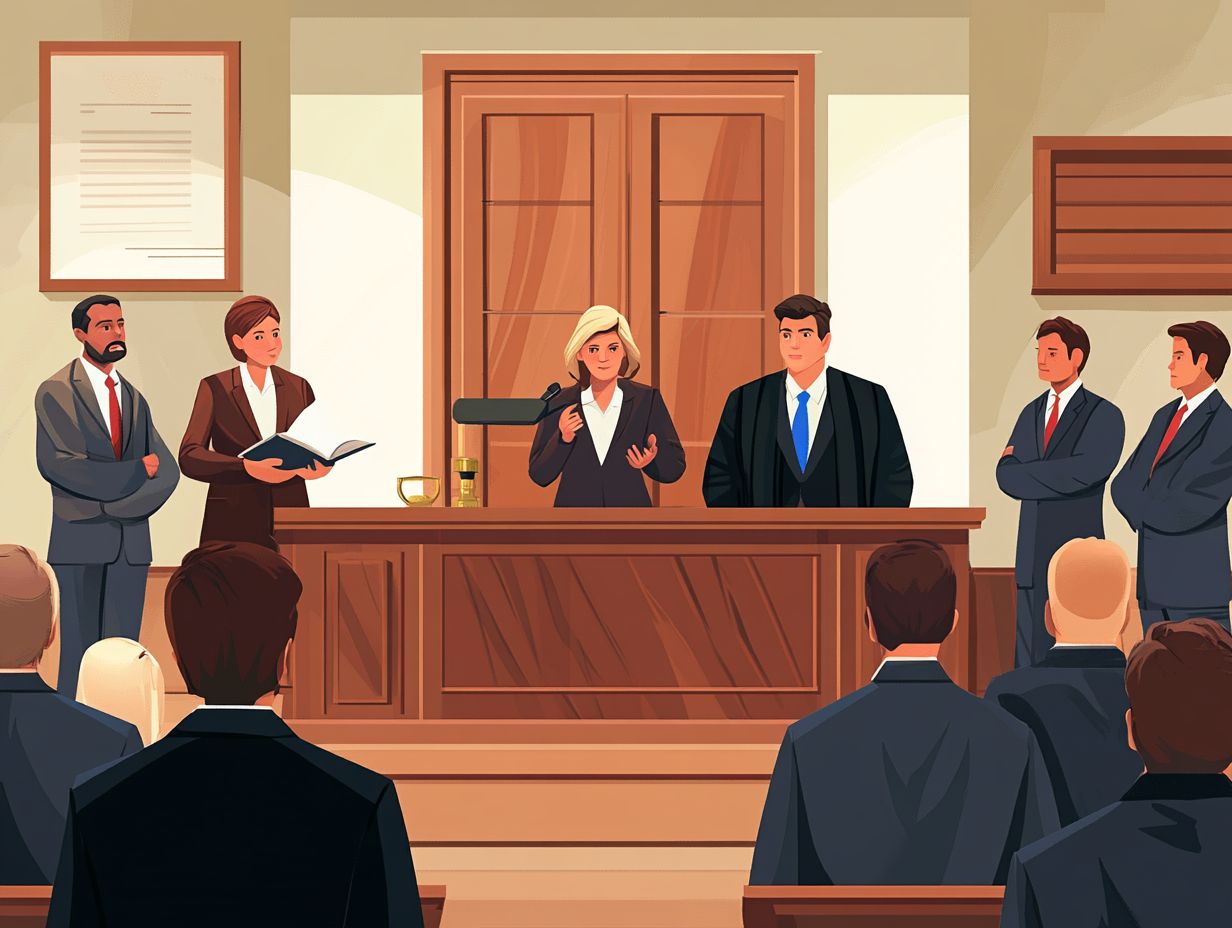
Character witnesses can dramatically change the outcome of a trial. By shaping the jury’s perception of the defendant, they offer invaluable insights into the individual’s character, which can sway opinions and impact final sentencing decisions.
How Witnesses Can Influence the Outcome
Character witnesses can significantly influence the outcome of your case. They reinforce your defense strategy through emotional narratives and positive portrayals that resonate with the jury’s perspective.
These witnesses have the power to make you relatable. They offer stories that evoke empathy and understanding from the jurors. When they share personal anecdotes or highlight your integrity, they craft a narrative that counters the prosecution s portrayal.
This emotional connection is crucial. Jurors often rely on their feelings when making decisions. When their testimonies align with your defense s core arguments, they enhance your case’s credibility. This makes the jury more inclined to view you favorably, ultimately shaping their deliberations and verdict.
Potential Challenges and Limitations
Character witnesses can be invaluable assets in your defense strategy. However, it’s important to recognize the challenges and limitations that may influence their credibility and the effectiveness of their testimony.
Addressing Counterarguments and Criticisms
Addressing counterarguments surrounding character witnesses is essential. This solidifies their role in your defense strategy while adhering to legal and ethical standards.
Critics argue that the subjective nature of character assessments can lead to biased opinions. This may undermine the objectivity necessary in legal proceedings. The reliability of such witnesses may be scrutinized if their personal stakes in the case are perceived as high.
It s vital to emphasize the legal standards that govern witness credibility, such as the consistency of their testimonies and their long-term knowledge of your character.
By conducting thorough background checks and ensuring your witnesses are genuinely qualified, you can effectively mitigate these concerns. This reinforces an overarching narrative of integrity and trustworthiness in court.
Preguntas Frecuentes
1. C mo puede beneficiar el uso de testigos de car cter a una estrategia de defensa?
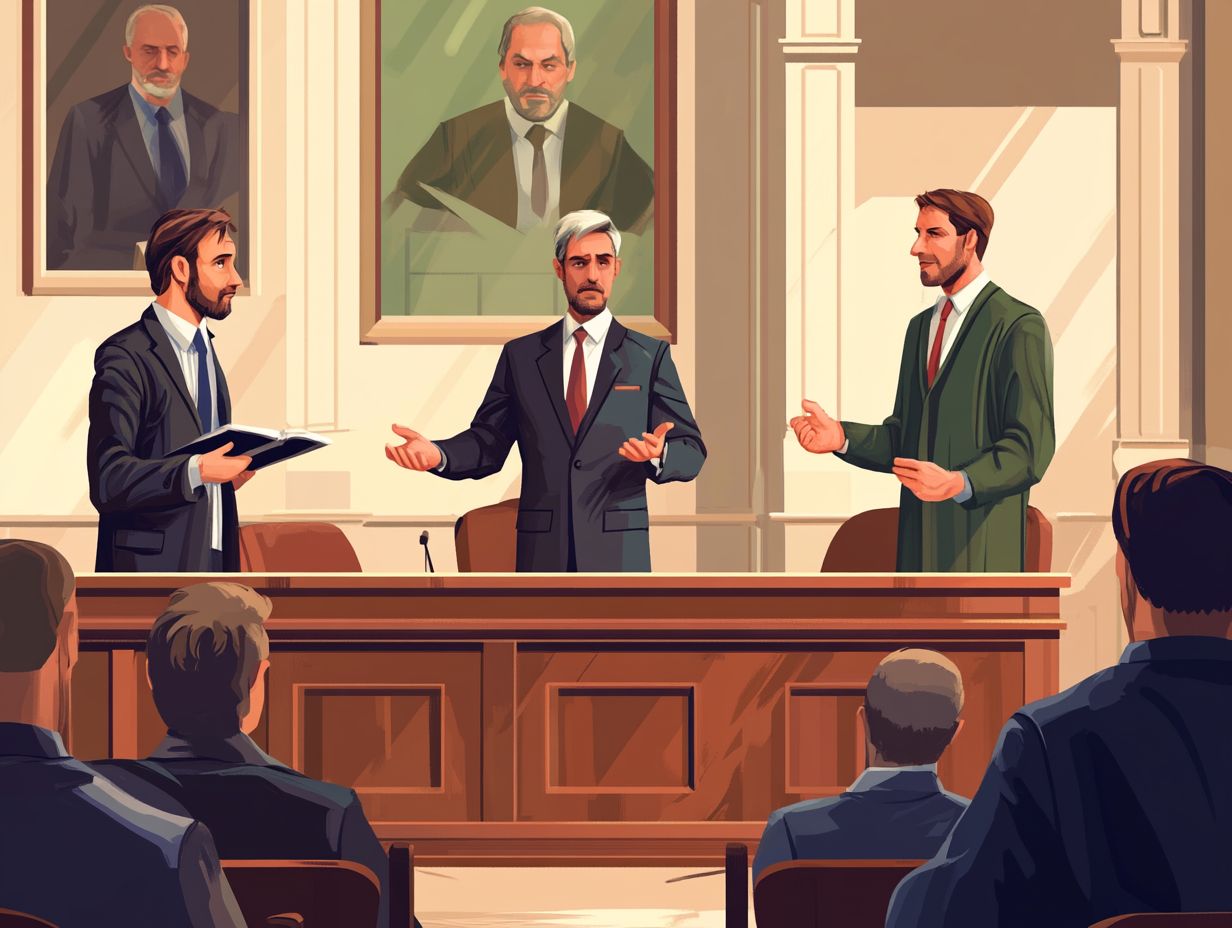
El uso de testigos de car cter puede beneficiar a una estrategia de defensa al proporcionar evidencia del buen car cter y reputaci n del acusado en la comunidad. Esto ayuda a contrarrestar cualquier percepci n negativa que la fiscal a pueda presentar, influyendo en el jurado para que vea al acusado de manera m s favorable.
2. Qui n puede ser considerado un testigo de car cter?
Un testigo de car cter puede ser cualquier persona con conocimiento del car cter y la reputaci n del acusado. Esto incluye amigos, familiares, colegas, y l deres comunitarios. Tambi n pueden ser testigos expertos como terapeutas o consejeros. Es importante elegir testigos cre bles que puedan hablar positivamente sobre el acusado.
3. C mo pueden usarse estrat gicamente los testigos de car cter en un caso de defensa?
Los testigos de car cter pueden usarse estrat gicamente al resaltar aspectos espec ficos del car cter del acusado que son relevantes para el caso. Por ejemplo, si el acusado enfrenta un cargo de crimen violento, los testigos pueden testificar sobre su naturaleza pac fica, creando dudas sobre el caso de la fiscal a.
4. Pueden ser interrogados en contra los testigos de car cter por la fiscal a?
S , los testigos de car cter pueden ser interrogados por la fiscal a. Pueden ser preguntados sobre su relaci n con el acusado, su conocimiento de los eventos y cualquier posible sesgo. Es crucial que los testigos est n preparados para el interrogatorio y se mantengan ver dicos y consistentes en su testimonio.
5. Son siempre beneficiosos los testigos de car cter en un caso de defensa?
Si bien los testigos de car cter pueden ser tiles, no siempre son beneficiosos. Si tienen un historial criminal o una reputaci n cuestionable, su testimonio puede perjudicar el caso. Es importante considerar cuidadosamente el impacto potencial de cada testigo antes de decidir llamarlos a testificar.
6. C mo deben ser preparados los testigos de car cter para el juicio?
Los testigos de car cter deben prepararse discutiendo el caso con el abogado defensor. Es fundamental que entiendan su papel en la estrategia de defensa y est n al tanto de los hechos del caso.
Es til que los testigos de car cter asistan a un juicio simulado o a una sesi n de pr ctica. Esto les ayudar a dar su testimonio con honestidad y confianza. Prep rate bien para asegurarte de que tu testimonio tenga el impacto que deseas!


